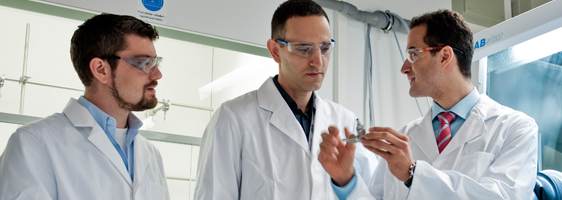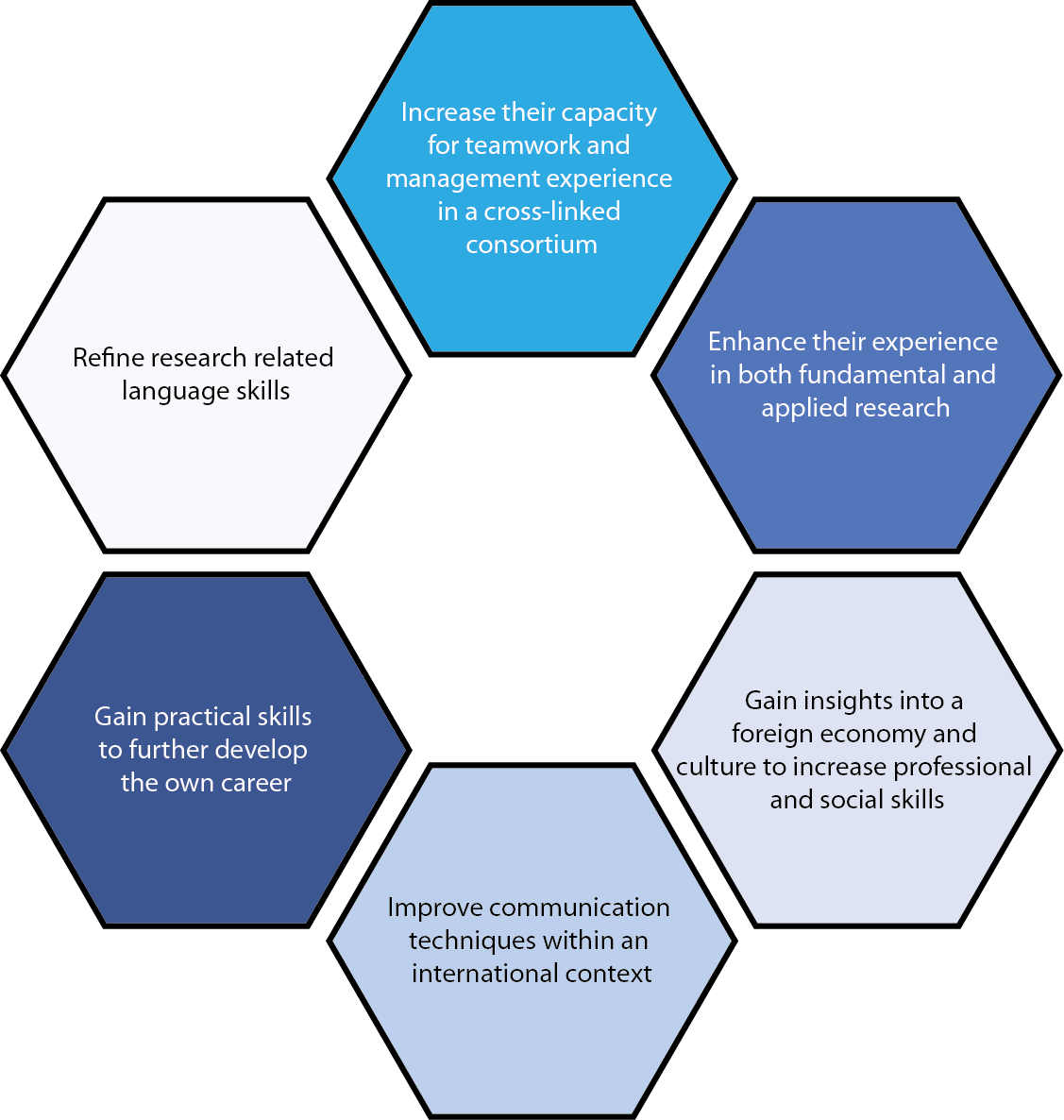Educational Program

Qualification Program
The qualification program aims to train doctoral researchers in the field of CoDiCoFRP with the multi-disciplinarity necessary to combine the different scientific methods and technologies and to exploit their synergies.
The German and the Canadian institutes cover in a complementary way the full range of research and educational competences which are a prerequisite for a successful interdisciplinary and holistic approach for CoDiCoFRP.
The doctoral researchers will be supervised by one professor of both the German and Canadian institutions. This bi-national supervision ensures continuous supervision during the doctorate at the home university and the host institution. These two professors will cover different aspects of the PhD topic in an interdisciplinary way.
The bilateral supervision based on the complementary competences of the German and Canadian partners represents an added value of cooperation. It implies that the ambitious education and research program supports a timely completion of the PhD projects within three years
Besides consolidating their scientific knowledge, the doctoral researchers will
- increase their capacity for teamwork and management experience in a cross-linked consortium
- further develop their experience in both fundamental and applied research
- gain practical skills to further develop their careers
- improve their communication techniques and languages skills within an international context and
- gain insights into a foreign economy and culture to increase their professional and social skills
Obligatory Curriculum
Communication, language and management skills are trained within the context of the obligatory curriculum. At the very beginning, the rules of good scientific practice will be communicated to all doctoral researchers. Additionally, the technological foundations and applications of lightweight constructions will be communicated to all doctoral researchers in form of a lecture series given by the participating German scientists with focus on the key IRTG research topics.
Contents of the Obligatory Curriculum:
- Lecture series on long fiber reinforced polymer structures
- Rules of good scientific practice
- Collecting and archiving research data
- Intercultural communication and presentation training
- International project management
- Human resource management and conflict management
- Scientific writing
Individual Curriculum
In the individual curriculum, the competences of the doctoral researchers will be trained and further developed depending on their previous education and subject of the PhD topic. This will ensure a broad qualification of the doctoral researchers.
Possible choices within the Individual Curriculum:
Regular lectures at KIT:
- Nonlinear Continuum Mechanics
- Atomistic Simulation and Molecular Dynamics
- Computational Homogenization on Digital Image Data
- Digital Microstructure Characterization and Modeling
- Fracture and Damage Mechanics
- Dimensioning of Components
- SmartFactory@Industry
- Global Production Engineering
Compact seminars at KIT:
- Workshop on Engineering Design
- Automated Manufacturing Systems and Quality Assurance
- Characterization and Modeling of Composite Materials
- Composites for Automotive Lightweighting
- Continuous process simulation of continuous FRP
- Polymer Composite Processing Technologies and Process Simulation
- Material Characterization based on Digital Image Correlation
- Computer Lab on "Numerical methods and microstructure simulation"
- Homogenization Methods in Continuum Mechnanics
- Machining of Fiber Reinforced Composites
- Fracture Mechanics
- Polymer Processing Technologies
Regular lectures at Canadian Institutes:
- FE Methods for Impact and Crashworthiness Analyses
- Theoretical Condensed Matter Physics, Scientific Computing
- Advanced Statistical Process Analysis
- Processing Simulation of Composites
- Topics in Vehicle Testing
- Composite Materials
- Advances in Polymer Materials, Introduction to Polymer Processing
- Computer Aided Machining and Measurements
- Fracture Mechanics
Courses at the International Centre for Mechanical Sciences (CISM, www.cism.it):
- Courses (typically one-week-seminars with different invited lecturers) held at CISM at Udine, Italy, are accepted as part of the Individual Curriculum
FibreMod Autumn Lecture 2017:
- The FibreMod Autumn Lecture (https://fibremod2017.mines-paristech.fr/About/FiBreMoD/) is also a possibily for the Individual Curriculum. It is organized by FiBreMoD, a Marie Sklodowska-Curie European Training Network project (www.fibremodproject.eu/about) in the field of composites. The 3-days-course takes place at The Materials Centre of MINES ParisTech (www.mines-paristech.eu).
Further measurements
A regular PhD seminar will be organized (approximately bi-monthly) and moderated by the doctoral researchers themselves. The doctoral researchers and the postdoctoral researcher will regularly organize thematic milestone meetings in order to ensure the attainment of the milestones. In each PhD generation, one workshop related to the IRTG milestones (milestone workshop) is organized to synthesize the new knowledge and methods by specific prototyping and testing. All the German and Canadian doctoral researchers will interact at these workshops.
The doctoral researchers from Germany and Canada will be able to take advantage of the complementary expertise of the institutions by visiting one of the partner institutions for an overall period of up to 6 months. During their compulsory visits, the doctoral researchers will participate in qualification programs, like the series of seminars and compact lectures offered by the Canadian and the German institutions.
Summer/autumn schools will be organized by the steering committee in cooperation with the doctoral researchers. They will take place in the first two years of each PhD generation, alternately in Canada and at KIT, and all doctoral researchers will present the results of their work. Experts in the field will be invited to give keynote lectures. Cooperation partners, members of the Industrial Advisory Board (see below) and the leading institutes in the research field will be invited to participate
An international scientific symposium, taking place in the third year of each PhD generation (alternately in Canada and at KIT), pursues the aim of an exchange of experiences with specialists from science and industry on an international basis. As speakers, internationally renowned scientists are to be attracted. The symposium is conducted to raise the international importance and profile of the IRTG, not only by publications but also by scientific meetings. The presence of all PIs is mandatory. All doctoral researchers and their advisors will meet during the symposium in order to finalize the plan for the PhD thesis.
Visiting researchers will be invited by the Steering Committee and the PIs to teach and to do research at the institutes of the IRTG. The teaching includes scientific lectures, multi-day contributions as well as compact seminars.
Benefits for Doctoral Researchers

